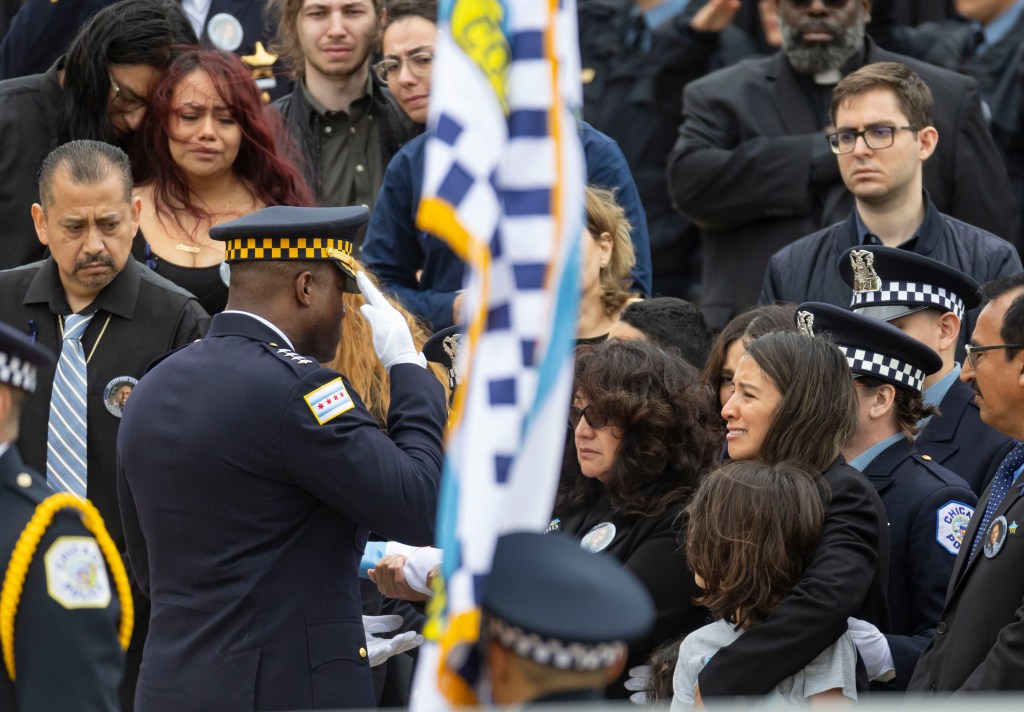Funerals have one rule above all others: respect the wishes of the bereaved immediate family.
So Mayor Brandon Johnson made the correct call in not attending St. Rita of Cascia Catholic Church on Monday morning for the funeral of slain Chicago police Officer Luis Huesca, even though his office had put out a schedule late Sunday saying he was going and even though Illinois Comptroller Susana Mendoza appeared to jump on a political opportunity for a mayoral humiliation.
On Sunday evening, Mendoza tweeted that Huesca’s “grief-stricken mother” had, at that day’s visitation for the fallen officer, asked both Mendoza and Rep. Angelica Guerrero Cuellar to communicate to Johnson that he was “unwelcome at her son’s funeral.” Mendoza said that they both had called the mayor before 10 p.m. only then to read the announcement of his planned attendance around 10:30 p.m. Sunday, as did we.
We’re familiar with the mayor’s long-troubled media operations, so it could well be the issue there was that whoever was sending out the schedule was not up to date on the events of the last hour. Mendoza was right to call the mayor and convey familial wishes, but she did not need to make all of that public. On the other hand, it also looks like the mayor dithered in what to do. He needed to stay away, at a mother’s request. That decision should have taken him about five seconds to make.
This may well have looked like a political problem for the mayor, given that the officer’s mother was asking him not to come on the grounds that she believed he was not supportive of Chicago’s police officers. But a grieving mother gets to ask what she wants to ask on the day of her son’s funeral, whatever the political cost to anyone else. Period.
There were reports that Gov. J. B. Pritzker also had been asked to stay away (and did, although the funeral did not appear on his official schedule) and other public figures considered by the family to be insufficiently supportive of police officers being either discouraged from coming or asked to leave.
What do we have say to about that? It’s pretty simple. Funerals and wakes are not political events. People often go to them as part of their jobs, as well they should, but those attendees do not have the standing there of those who have loved and raised the lost person. The bereaved family gets to say what it wants, what it feels, and it behooves everyone else to shut up and follow their instructions. When a parent has lost her child, that is all that matters on the day of a funeral.
Funerals can certainly have political impacts: look at what happened in Chicago in 1955 when Mamie Till-Mobley opened the casket of her son, Emmett Till, for all to see what was done to him. But that was a shattering and profoundly courageous decision made by his mom, the only person with the moral authority to do so in that moment.
In this case, a mother made a different choice, as was her right. What Edith Huesca did might also have an impact when it comes to the public support of Chicago police.
For once again here, Johnson has run into the chronic problem of trying to be both an activist, prone to anti-police rhetoric and in the thrall of the far left, while also being the mayor of a city whose job it is to pay respect to the daily dangers faced by police officers and to urge us to better appreciate not only their sacrifices but those of family members terrified they will not arrive home safely at the end of their shift.
As was the case with Huesca, a six-year veteran of the force.
Huesca was killed just a few blocks from his home in the Gage Park neighborhood on the Southwest Side on April 21. He was driving back from work at about 3 a.m. in the 3100 block of West 56th Street when he was shot, according to police Superintendent Larry Snelling. According to the police, a ShotSpotter alert brought officers racing to the scene, where they then found the 30-year-old Huesca (who was still wearing his police uniform) with multiple gunshot wounds, a victim of an apparent carjacking, given that Huesca’s vehicle was allegedly stolen. On Friday, a warrant was issued for the arrest of Xavier Tate Jr., 22, an Aurora man. Tate is charged with the first-degree murder of Huesca and, as we write, is still at large and to be considered armed and dangerous.
Like the killing of Officer Ella French in 2021 and the death of Officer Aréanah Preston in 2023, the murder of Huesca shocks us to the core. It reminds us of the huge dangers faced by Chicago police, as well as the lack of safety in our city’s neighborhoods. We don’t know if Huesca’s uniform motivated the carjacking or whether the same fate would have befallen a citizen who was not a police officer. We do know French, Preston and Huesca all were young people with much living left do.
We also believe the lack of support clearly felt by Huesca’s family should prompt some soul-searching by some of our politicians and those who work for them. In general, we see far more passion publicly directed at what many of these leaders view as police misdeeds or excesses compared with how they express grief or sorrow when an officer is cut down in our gun-riddled city.
Every tired Chicagoan deserves to able to come home late at night from their work and make it there safely.
Then, instead of witnessing funereal politics intensified by unspeakable grief, we could all rest more easily in our beds.
Submit a letter, of no more than 400 words, to the editor here or email letters@chicagotribune.com.


